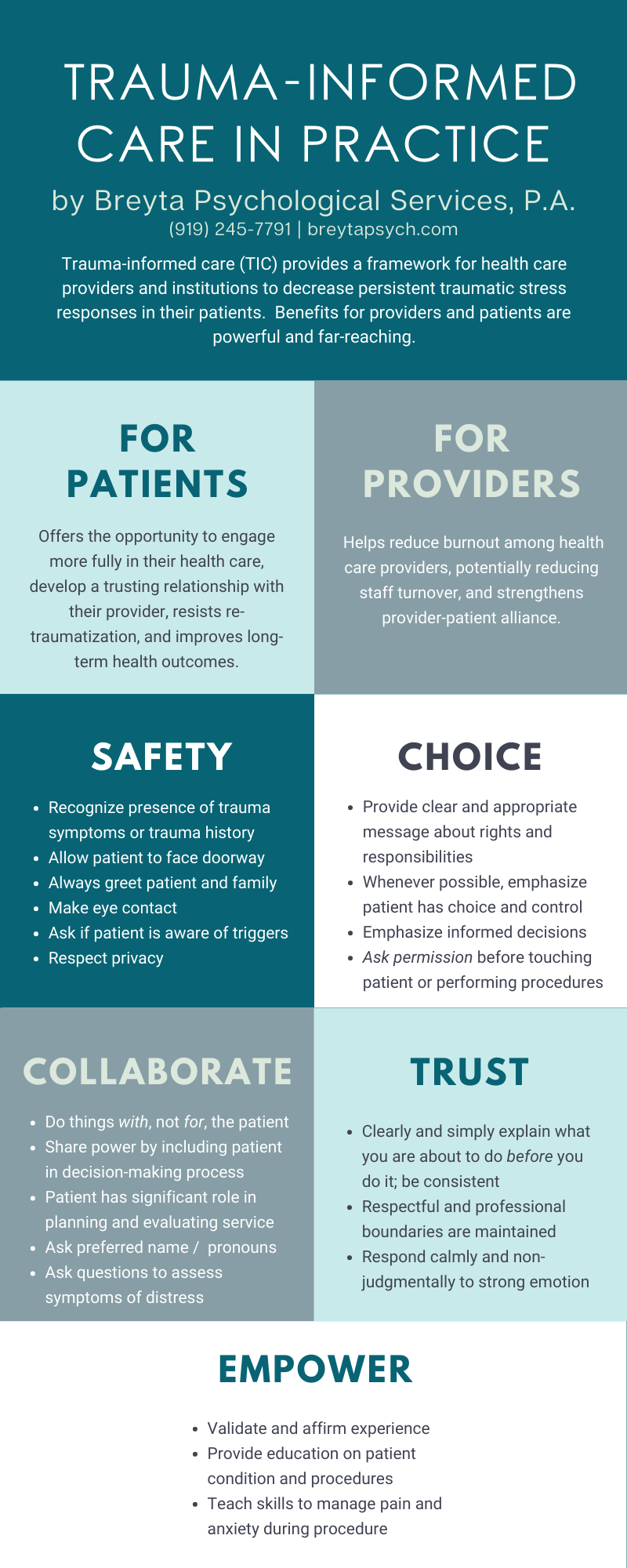Trauma-Informed Care In Practice
/by Vanessa Roddenberry, Ph.D.
If you're a trauma survivor, you deserve Trauma-Informed Care (TIC) from your medical professionals. If you're a provider, you should be aware of the importance and benefit of trauma-informed care to your patients.
What Is Trauma-Informed Care?
Trauma-Informed Care encompasses both an organizational and interpersonal approach to client care that recognizes the likelihood, impact, and ramifications of trauma on an individual.
In our society, the experience of trauma is fairly ubiquitous. Individuals may experience trauma during childhood, adulthood, or both. Trauma may be of an acute, chronic, or complex nature. Acute trauma occurs at one time point (e.g., a car accident), while chronic trauma occurs over an extended period of time (e.g., years of sexual abuse). Complex trauma entails exposure to multiple traumatic events (e.g., childhood abuse, a medical trauma, and domestic violence).
For survivors, the after-effects of a trauma can be difficult to live with. If these symptoms maintain long enough with sufficient severity, they may meet criteria for PTSD. Whether PTSD criteria is met or not, trauma leaves its imprint on the survivor.
Trauma Impacts the Big Five: Safety, Trust, Control, Esteem, and Intimacy
It can be difficult for survivors to experience a felt sense of safety emotionally and physically. Furthermore, trust is often ruptured between them and others or the world in general. Trauma, which by it’s very nature is an event that happens “to” an individual can also make one feel that they have very little control. This can result in either ceding control and feeling helpless, or needing to feel completely in control to stave off perceived future threats. Survivors often struggle with questioning their self-worth, and that of others. It can also be extremely difficult to allow others to be close with them, either physically or mentally.
Struggles within these thematic areas result in interpersonal, professional, and emotional problems for survivors. One area that is significantly impacted is physical wellbeing. Survivors often fear placing their health, and thus their trust and safety, in the hands of someone else. Often being physically touched feels literally threatening or painful. As a result, survivors may seek care less often if not outright avoid medical care at times.
It’s vital that healthcare institutions take into account the large percentage of their patient population that is likely to present with a trauma history. These individuals may not necessarily report being a survivor if not directly asked, for fear of having to recount painful memories. Even when directly questioned, it’s possible that for emotional or privacy-related reasons they may not wish to disclose their experiences. However, it is incumbent upon the medical professional to educate themselves about the nature of trauma and its subsequent symptomatology. The literal and figurative scars of trauma are painful and recounting the traumatic event(s) outside of a therapeutic environment may be deleterious. We live in an age in which we have a clear understanding of the pervasive and pernicious nature of trauma within our population. The standard for care must not aspire to include TIC, but rather should incorporate it as the standard.
If providers approach all care with a trauma-informed lens, they are erring on the side of caution; ensuring the best possible care for all clients.
Organizations may incorporate this understanding into their policies and procedures. Individuals may request TIC from their providers, and providers can advocate for and model TIC for their patients and staff.
How Can Trauma-Informed Care Help Survivors?
Check out our helpful infographic to learn how to ask for and provide Trauma-Informed Care.















